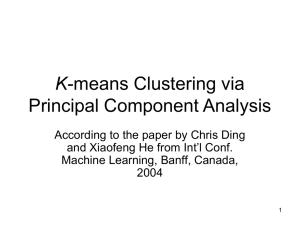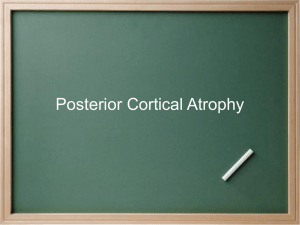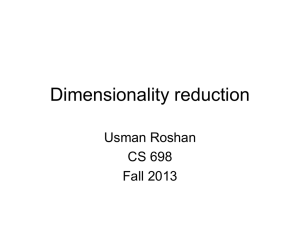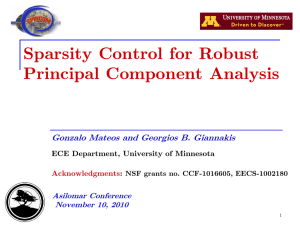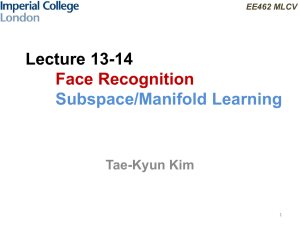Person-centred therapy today and tomorrow
advertisement
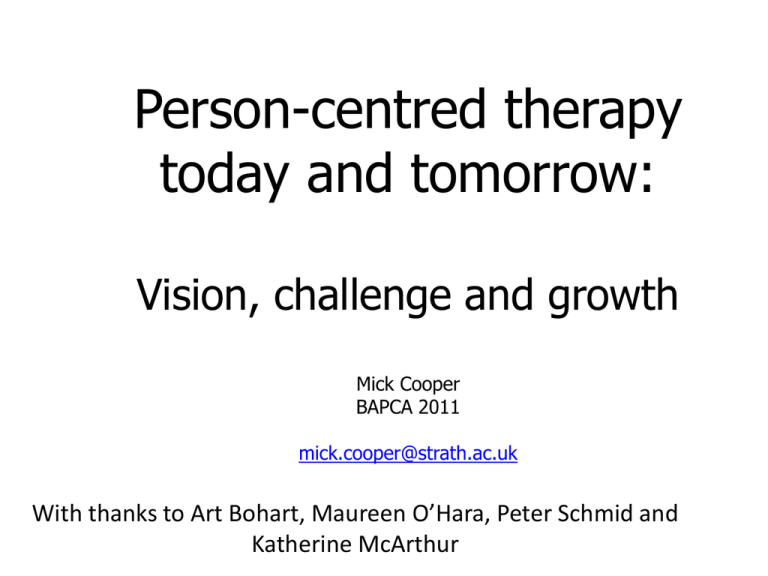
Person-centred therapy today and tomorrow: Vision, challenge and growth Mick Cooper BAPCA 2011 mick.cooper@strath.ac.uk With thanks to Art Bohart, Maureen O’Hara, Peter Schmid and Katherine McArthur Aims • To present a personal view of: –Current challenges –How we can meet (and grow through) the current challenges • Based on a personal vision of the PCA Draws from new introduction to The Handbook of PersonCentred Psychotherapy and Counselling (2nd ed., due late 2012) A personal vision of the personcentred approach: Core values Contributing to greater social wellbeing and equity Developing ways of engaging with people that are deeply respectful and valuing A personal vision of personcentred therapy: Principles Clients as resourceful, agentic humans – as worthy of respect as their therapists Non-pathologising Responsive to individual clients: Relational responsiveness over standardised techniques THE CHALLENGES 1. The rise of ‘evidence based’ therapies • Therapeutic practices only valid to the extent that they have been ‘proved’ to work • Person-centred therapies tend to lack the ‘right’ sort of evidence (i.e., manualised, experimental RCTs for specific psychological ‘disorders’) 1. The rise of ‘evidence based’ therapies • Ideology of EBTs has become dominant in many countries: e.g., UK (NICE), Germany, USA… Direct impact on provision of PCA • UK: publicly-funded person-centred services decommissioned/under threat • Germany: PCA is “gradually and increasingly disappearing from sight” 2. Dilution of person-centred values practices in haphazard syncretism Moves towards integrative practices -- away from single-orientation specialisms “Everyone ’does’ empathy, UPR, congruence these days” “Just the basics” Attempts from within the PCA field to integrate, unsystematically, other practices “Anything goes” PCA principles and values lost in bland mishmash of practices 3. Global social, environmental and economic threats • PCA doesn’t operate in a vacuum • No world, no PCA! • Is person-centred therapy achieving its potential if so much of world is not? GROWTH: MEETING THE CHALLENGES 1. Consolidating and developing the PCA evidence-base • Disseminating the evidence that does exist for PCA therapies • …Becoming familiar with it ourselves 1. Consolidating and developing the PCA evidence-base • Developing and enhancing the evidence-base… • Taking responsibility for generating evidence (no-one is going to do it for us): MSc, PhD, service evaluation • Conducting ‘research that counts’… 1. Consolidating and developing the PCA evidence-base • Randomised controlled trials (RCTs): e.g., – BACP’s funding of trial of IAPT-based ‘Counselling for depression’ – Katie McArthur’s PhD pilot trial of school-based humanistic counselling 1. Consolidating and developing the PCA evidence-base Research that counts: • • • • Systematic reviews of PCA evidence Case studies Developing PCA measures Qualitative studies of helpful factors in PCA • Improved PCA practices 2. Articulating, and taking forward, the PCA’s unique contributions to the “melting pot” of therapeutic practices • What is our unique contribution…? 2.1. A humanising commitment • Keeping to the fore a deep respect for clients • Reconceptualising psychological distress in non-pathologising terms: e.g., Margaret Warner’s difficult processes 2.2. Understanding clients as active agents of change • Client as instigator – not subject - of change • Therapist as catalyst, not cause • Powerful research support • Links to related approaches, such as Duncan, Hubble, Miller… 2.3. Non-directivity • The therapeutic importance of supporting clients to take the lead 2.4. Deep relating • More than a working alliance, but the healing power of a deep and enduring connectedness • Relational depth… • Dialogue… 2.5. Wellbeing as self-concordance • PCA is one of the few orientations to emphasise the therapeutic value of being “true” to ourselves… • Supporting people to prize their own diversity and uniqueness: whether personality, sexuality, ethnicity, etc. • Strongly supported by social psychological research: Sheldon, Kasser, Self-determination theory… 2. Articulating, and taking forward, the PCA’s unique contributions to the “melting pot” of therapeutic practices, through… • Discussing with colleagues/Ensuring these contributions aren’t neglected • Developing new theories/practices • Research, e.g….. Findings from contemporary RD research (e.g., Knox, Wiggins, Murphy, McLeod…) • Most therapists, and many clients, experience moments of RD in therapy • Experiences of RD are strikingly similar across individuals: e.g., timelessness, aliveness, immersion, ‘soul-to-soul encounter’ • There tends to be a high level of matching between a therapist’s, and a client’s, experiencing of RD Findings from contemporary RD research (e.g., Knox, Wiggins, Murphy, McLeod) • Both clients and therapists report that the experience of RD is associated with positive outcomes – quantitative evidence (Wiggins, 2011) suggests that it may be a key predictor • For RD to take place, therapists need to be experienced as genuinely caring and real… • but clients needs to choose to open themselves up to the therapist 3. Developing person-centred principles as a basis for integrative practices • Deep respect for clients can be basis for new integrative practices: – Responsiveness – Openness – Collaboration – Transparency • E.g., David Cain’s “Collaborative person-centered psychotherapy” “Pluralistic” approach to therapy • To try and develop ways of conceptualising, and practising, therapy that… • Maximise empowerment of clients • Allows therapists to be open to – and draw on – their knowledge, skills and resources • Respects the work of other therapists – whatever their orientation Pluralistic approach: Basic assumptions 1. Lots of different things can be helpful to clients 2. If we want to know what is most likely to help clients, we should explore it with them Pluralistic approach • Emphasis on collaborating/metacommunicating with clients over aims and methods of therapy • Can be both: – “Meta-therapeutic” framework for conceptualising therapeutic field – Integrative practice pluralistic practice specialist practice PCT 4. Taking PCA concepts and practices back into the socio-political realm • Developing Rogers’ political work in the fields of: – Peacework – Emancipatory learning – Organisations – Sustainable communities • Linking to service user organisations (Sanders) CONCLUSION Being expansive • Challenges can lead to… • Anxiety… • Defensiveness and shutting down • Our biggest contemporary challenge may be to see current challenges as opportunities rather than threats Growth through adversity • Current challenges offer us an opportunity to: – Improve our practice and theory – Develop our unique potential – Enhance our contribution to the therapeutic – and global – community Growing The challenge of being personcentred in a person-centred way Creative Rigid selfExperiential Concept as field “Person-centred Therapist” Attuned to our core value and principles: Deeply ourselves Thank you mick.cooper@strath.ac.uk
